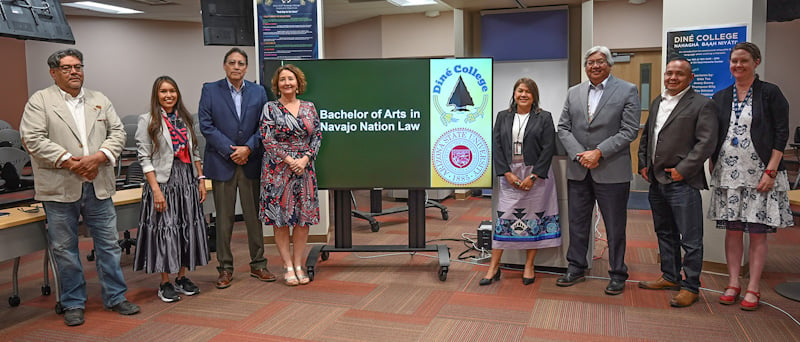ASU Law, Diné College create pathway for Navajo law degrees

Charles "Monty" Roessel (third from left), president of Diné College, and Stacy Leeds (fourth from left), the dean of the Arizona State University Sandra Day O’Connor College of Law, along with other staff members, are teaming up to offer undergraduate and graduate law degrees focused on the Navajo Nation. (Photo courtesy of Chris Burnside)
Aiming to increase the number of legal professionals practicing tribal law, the Arizona State University Sandra Day O’Connor College of Law and Diné College are partnering to create a package of undergraduate and graduate law degrees focused on the Navajo Nation.
“The Navajo Nation is a legal desert and the backlog in the judicial system because of a lack of lawyers is just something that will take decades to get through at the current rate,” Charles “Monty” Roessel, president of Diné College, told the ABA Journal.
There are 532 members of the Navajo Nation Bar Association, Yolanda Wauneka, executive director of the NNBA, wrote in an email to the Journal.
Starting this fall, Diné College, the oldest U.S. public tribal college, will offer an online bachelor of arts degree program in Navajo law, Roessel says.
“The next step is then to start creating the ‘law school’—and we use that with quotation marks because it’s not necessarily a juris doctorate,” he adds.
While Diné College graduates would not be automatically accepted into the Arizona State University programs, “they would have an inside track,” Roessel says.
Stacy Leeds, the dean of ASU Law, told the Journal that the program includes mentoring and law school pathway advising for Diné College students.
He aims to have students who receive the Navajo Nation Scholarship at Diné College have it follow them to ASU Law, he adds.
In January 2025, ASU Law will begin offering a master’s in legal studies plus a master of laws in tribal policy law and government, Leeds says. The 30-credit hour MLS will teach specific tribal laws to prepare students to take the Navajo Nation bar exam, which does not require a JD for members of the Navajo Nation, Roessel says.
The new degrees add to ASU Law’s established Indian Legal Program, which allows students to apply for licensure by state and Navajo Nation bars.
“Ideally, there will be some students who do their bachelor’s degree at Diné College in Navajo law and then do their master’s degree here at ASU Law also in Navajo Nation law,” adds Leeds, a member of the Cherokee Nation and a former Cherokee Nation Supreme Court justice.
Experiential learning will be emphasized in all programs. Diné College plans to build a place to have mock court trials, Roessel says.
Currently, ASU Law’s Indian Legal Program includes working in the Indian Legal Clinic on matters including voter discrimination, climate impact and participating in matters working in state, tribal and federal courts.
“For the Navajo Nation and other tribes, so much of their individual and community rights are wrapped up in this complex legal structure,” Leeds says. “It’s why the community needs more talent in the legal arena. It is so heavily influenced by law and regulations.”
Plans for an educational pathway leading to the Navajo bar exam has been discussed for many years at Diné College, Roessel adds.
“There used to be a lot of legal advocates, but now they are retired. Young people are going into law school, but they are leaving the reservation,” Roessel says. “We’re hopeful now that the students who graduate can also pass the Navajo bar and start practicing as an advocate immediately.”
Native American and indigenous people are underrepresented in the U.S. legal profession, beginning in law school. While Native American people account for less than 3% of the U.S. population, according to the 2020 census, 0.4% of law students and 0.7% of attorneys were Native Americans in 2022, according to data from the ABA.
Write a letter to the editor, share a story tip or update, or report an error.



